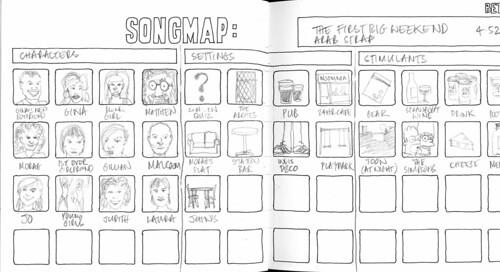I like that feeling. In the pit of your stomach. After you’ve jumped off something. Not just off a chair, or even a wall. Off something too high. Something so high you’re gonna hurt yourself. Unless you hit water.
Walsall Gala Baths. You weren’t allowed to jump off the diving boards. You had to ask permission to even dive off the highest. The White Board. Colour coded (in Jubilee Year). Red – fairly high; Blue – high; White - fucking high. Strict safety measures in place. A dressing room door, wedged across the stairs from The Blue to The White. Marker pen warning: “NO ACCESS TO WHITE BOARD WITHOUT PERMISSION! That includes you, Wilson”.
The pool looked so small from up there. A whistle. Everyone stops and looks up. No pressure. If you dived badly, (belly flop, back flop) it really hurt. But if you got it right, fantastic. But not the same as jumping. Diving tells your body it’s safe. Head first. You know what you’re doing. That stomach-pit panic doesn’t grip.
Winter 1980 (81?), mid-week. Dark outside. Kick out time. Just you and your mates left. Ask the attendant. (Not life guards. Not in the Midlands). Ask the attendant:
- Can I just go off The White?
- Yeah, alright. If you’re quick.
Pad round the pool side. The water is already becoming still. You used to think it would take half an hour for a pool this big to quiet. But look. It’s only moving gently now. As your trot up the rough wet stairs to the side of The Red. Turn left. Steps up. Pulling yourself up by the hand rails. Left. Onto The Blue walkway. Left. Steps. Up. Over the wedged cubicle door. Top board. The White.
Walk to the edge. Toes curl round the hard concrete. Shivering. Pool shifts slowly. One big ripple. Your mates, halfway down the poolside. You sway. Look down. Instinctively, your hands move. They cup your bollocks.
It could really fucking hurt your balls jumping from this high, and there’s that thing you’ve heard about hitting water so hard it pushes your bollocks back up into you body, but that’s probably like that story that if you are in a falling lift you should keep jumping because if you’re in the air when it hits the ground it will reduce the impact and you might not die.
You jump. You drop fast. Your stomach tightens. The feeling starts lower; moves up your body; towards your chest. You count.
One.
Two.
Thr-
The dark blue of the deep end. You don’t quite hit the bottom. Kick legs. Break surface with a shake of your head. Swim to the side. Pull yourself up the cold metal steps. The attendant... laughing.
Showers. Shouting. Changing room. Chip shop.
***
Afterword:
This short story was included as a chapter in the solo performance versions of Words & Pictures. It was also the piece that inspired the title to the performance of Off the White (actually about benches) and also partly Learning to Swim, both pieces I made with Paula Diogo. Reading this lovely piece by Emma Adams reminded me that I had been meaning to post it here for a while. So here it is.











































